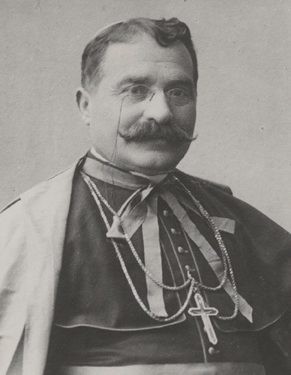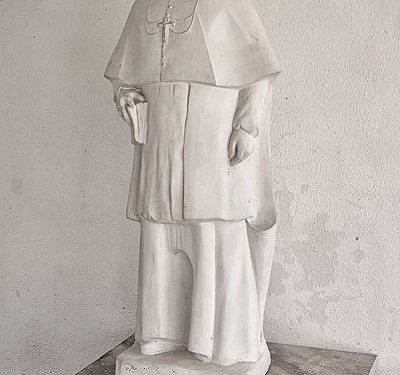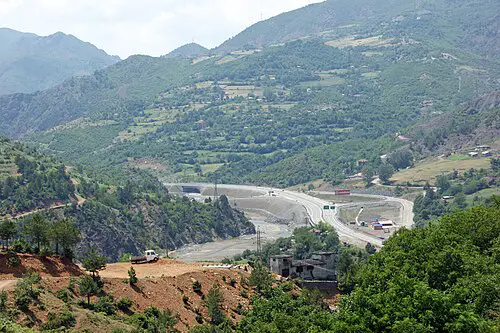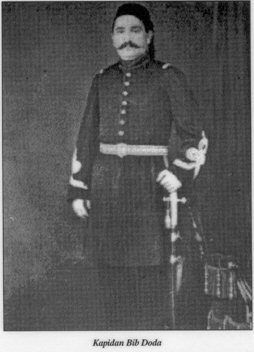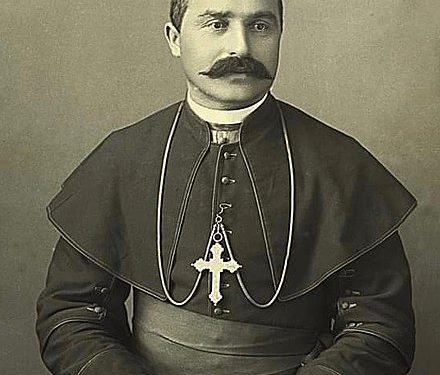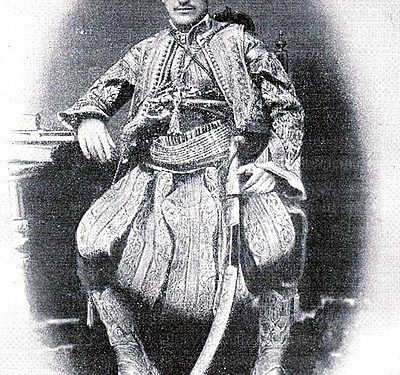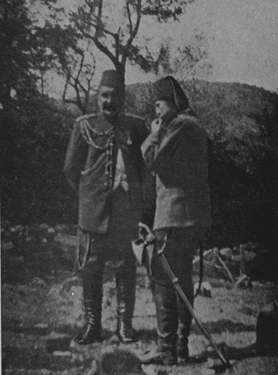The First Part
Memorie.al / For many years it has been said and held that Koli Kristofori (Rev. Nicholas Christopher) was the first Albanian immigrant to the United States of America. He entered the USA in 1886 (and in 1908, he appears in Boston documents as a priest, a member of Fan Noli’s Albanian Episcopate), but in fact, the first Albanian to set foot and reside on North American soil was Monsignor Preng Doçi (Primus Docci or Dochi, according to the respective spelling of the name in Italian, French, and English), who later became Abbot of Mirdita and advisor to the Captain of the Mirdita tribe, Prenk Bibë Doda. He was also a distinguished Albanian patriot, whose activity was covered in oblivion by communist historiography. An Albanian Rilindas (National Revival figure), imprisoned and exiled by Turkey, and the main promoter of the modern Albanian alphabet, publisher of artistic and scholastic works (writing under a pseudonym), a wise fighter, as described by Edith Durham.
Regarding this figure, who has not been properly valued, the well-known publicist Ndue Dedaj recently wrote in the newspaper “Shqip” that: “It has often happened that national figures, whose lives are intertwined with politics, are not appreciated in time, because the political seasons that followed have not created the right climate for illuminating their work. It has taken time to emerge from the darkness of oblivion, prejudice, and lack of communication. And placing Monsignor Doçi in his rightful place will not be an easy task.
Despite a certain unveiling of his figure in recent years, mainly through publications, for the majority of Albanians, he continues to remain almost as he was in his time: ‘much mentioned, but little known,’ as Shahin Kolonja defined him, because we have not yet oriented ourselves towards the peaks of history. It is from here that the analysis of his complex work must begin, as a poet of the beginnings of the National Revival, a high church prelate and church reformer, and a standard-bearer.”
Preng (d) (k) Doçi (Dochi), was born on February 7, 1846. The life and work of Abbot Doçi are divided into several periods. The first period belongs to the time when Preng Doçi was a young priest full of patriotic zeal; the second period, when, as a mature man, he went through prisons and exile; the third period, when he took the position of Abbot, and as a high prelate and mature diplomat led the Abbey, which was ranked as a diocese, and advised the Albanian minds of the National Revival figures; the fourth period, when the Abbot, with his wisdom, supported the Albanian Government, which found itself in severe governing trials during the Balkan Wars and World War I.
After completing his studies in 1871, Dom Prenga, equipped with theological and patriotic knowledge, returned to Albania, and without spending much time with relatives and his birthplace, he was appointed parish priest in Korthpulë. In addition to caring for the spiritual state of the people, he was deeply concerned about the difficult situation of the Mirdita people under the Ottoman yoke. Inspired from the very beginning of his youth with the simple patriotic idea, as soon as he set foot on the land of his ancestors, in Mirdita, due to the continuous pressures of the occupiers, in addition to his spiritual care for the faithful, he dedicated himself to the national cause. He reinforced the national cause even when he served as chaplain and secretary to the Abbot of Orosh, Dom Gaspër Krasniqi, during the years 1872-1875.
The Mirdita uprising of 1876-1877 against the Ottomans was the result of the organization by Dom Preng Doçi and the Bajraktar (standard-bearer) of Mirdita, Prenk Bibë Doda. For this purpose, in 1877, he bound the Captain of Mirdita, Prenk Bibë Doda (whom he found as a 14-year-old in the Mirdita Abbey; and educated him), and connected with the leaders of the Albanian National Movement in Kosovo, Dibër, Lurë, Malësia e Madhe, Shalë and Shosh. Around this time, in the name of the Albanian insurgents, he also established contact with Prince Nicholas of Montenegro, for a joint Albanian-Montenegrin anti-Turkish war. He placed Prenk Bibë Doda, who was very young, at the head of the uprising, and when he fled, Dom Prenga himself led the most decisive battles. During that period (the 1870s of the 19th century), the situation in Mirdita was even more difficult for two reasons:
The hereditary Captain, Prenk Bibë Doda, was very young; “a faction of Mirdita leaders, at that time in important service in the Turkish army, tried to take the Captain’s House, thus eliminating the Gjomarkaj family, and this was militarily attempted with the direct intervention of Turkey. Therefore, the Turkish reprisals of 1876-1877 should be viewed through this lens, as a struggle for power, to the great detriment of the national cause in general!”
Because of this organization, the Bishop of the Diocese of Lezha, Francesco Malczynski, an Austrian citizen of Polish nationality from Ukraine, managed to suspend (excommunicate) Dom Prenga from his priestly duties. This is also made known by British consular sources, which state that: “His Excellency, the Bishop of Lezha, Monsignor Malczynski, a Pole from the East, has done everything possible to stop the perpetrators of the revolt in a part of Mirdita, which was poorly directed by foreign intrigues. He even suspended from priestly functions, Dom Primo Dochi, for whom Your Grace complained on behalf of His Excellency, Shefqet Pasha.”
Dom Prenga, now aware of what the Bishop thought of him, and not seeking mercy from him, fled to the mountains, along with many fellow villagers. Thus, in May 1877, Dom Prenga, along with some companions, set off through mountain trails to go to Cetinje and further. But his journey was very short, because in Vuthaj of Gucia, he was captured by Turkish soldiers and from there, they sent him to Peja and finally to Istanbul, Turkey. From this day, for the 31-year-old Dom Preng Doçi, a life full of trials began, which would last a full eleven years, crossing three continents of the world.
After being sent to the Istanbul prison, thanks to a compatriot, Nikollë Përlaskaj, who happened to be a guard in the then-Constantinople prison, Doçi managed to contact the Catholic Patriarch of that capital, the Armenian Stefan Azarian, who, as soon as he was notified of the matter, took action to free Dom Prenga. Patriarch Stefan Azarian, who was a friend of the Sultan (and in this case betrayed him), and with his help, by giving him the name Pére Achile, was released from prison, on the condition that he would not return to Albania. First, he went to Rome, from where he sent a telegram to the Archbishop of Shkodra, telling him that he had miraculously escaped from the hands of the Ottomans and was now in the ‘Urbano’ College, where he had completed his studies. Later, he managed to travel to Tivar, where he met his mother and sister for a few months.
Overjoyed, Dom Prenga eagerly set off for the dreamed-of Rome. On 7.VII.1877, from Rome, he sent a letter to the Archbishop of Shkodra, announcing that he had miraculously escaped from the clutches of the Turkish soldiers, and that he was now in Rome, at the ‘Urbano’ College, where he had finished his studies. Since he was forbidden to return to Albania, Doçi, having received approval from the Holy See, set off for a mission in the New Land (America), Newfoundland, in 1877.
That his previous situation was known to his superiors is also evident from the biographical notices of M.A. Mailloux, extracted from the newspaper “Le Canadien,” published in February 1878. “We have said a word about the unrest that broke out in Mirdita, and we have said that among the prisoners sent to Istanbul was a young priest, Father Primo Dochi, an advisor to Prince Bib Doda, of Mirdita. Dervish Pasha, a sworn enemy of the Mirdita people, author and provocateur of the disturbances, which he calls an uprising, were instigated by him with the aim of conquering the Mirdita Mountains. He had sent the government a very unfavorable report about Monsignor Primo Dochi, imprisoning him along with five other compatriots in the prisons of Istanbul.
It was difficult to release this priest, especially during the time of martial law. Safet Pasha, motivated by the prayers addressed to him to do something good for Catholics, released Primo Dochi, on the condition that he travels to Rome, so that his presence in Istanbul or Albania could not be a justification for his enemies. In an accompanying letter, the Minister of Police, Safet Pasha, handed over the prisoner to Monsignor Azarian, who departed for Rome on the same day.”
Christmas of 1877, the time when the first Albanian set foot in America
The date of the arrival and settlement of Preng Doçi in Canada that we discover, according to the archives of “Propaganda Fide,” during the Pontificate of Pope Pius IX (1846-1878), is December 24, 1877. It states in french that: “Primo Docci on 24.12.1877 on his journey from Rome to Terre Nove Newfoundland will settle in the prefecture of St. Georges where he is assigned. “Primo Docci en 24.12.1877 (ancien du C.U., St-Jean TN) a Franchi: de son voyage de Rome a Terre-Neuve; attend de se rendre dans la prefecture de St-Georges TN ou il est destine – 51Or-51”.
This date is important because it is the date that indicates his settlement in Newfoundland, on Christmas Eve of 1877.
He may have arrived earlier, but this is the date that appears in the documents. And it is the first day that an Albanian set foot on the continent of North America. According to Wikipedia, he served in Newfoundland, and for a short period also in Wayne, Pennsylvania, in the USA, and later in Brunswick, Canada.
The newspaper of the time, “The Morning Freeman,” of Brunswick, dated October 22, 1881, also testifies to Doçi’s stay in the Canadian province of Brunswick. In the memoirs of some Canadian priests, Father Preng Doçi is presented as a very interesting example of patriotism and devotion to the flock.
Preng Doçi, the first translator from English to Albanian
Another testimony to his presence in Canada is found in the book “Twenty Years of Balkan Tangle,” by Edith Durham.
She writes that: The Abbot of Mirdita, Preng Doçi, was a man of remarkable qualities. “He had emigrated from Albania at a young age, after participating in the League of Prizren, having encouraged Albanians to resist Turkish rule and the decrees of the Treaty of Berlin, he spent his years of exile in Newfoundland (Canada) and India, working as a priest, where he had learned English and read extensively.
He was the inventor of an excellent system for the Albanian alphabet, from which he had removed all accents, using only simple Latin letters. He even convinced the Austrian authorities to use that alphabet in their schools, and was enthusiastic about the books he was to prepare. His plans were quite extensive and included the translation of many Standard English books into the Albanian language. He had even opened a small school in his church in the middle of the mountains.” This is a very interesting piece of news, also highlighted by the great friend of the Albanians, that the first books from English may have been translated into Albanian by Monsignor Preng Doçi.
But there are difficulties in tracing and finding his translations from English to Albanian, as he wrote a lot, but under pseudonyms. His journalistic writings and church reports sent to the Vatican testify to a modern style, although a proper investigation of all the material written by him has been lacking until now, which would create the possibility for a more complete judgment. Not for nothing has it been noted several times that: “Monsignor Doçi did not write little, but always without a name.” Doçi is mentioned as a prominent orator. A commemorative chronicle of “Hylli i Dritës” (The Star of Light), (April 1914), evoking Flag Day in Shkodra in 1912, at Rozafa Castle, highlights the speech of the Abbot of Mirdita on that occasion, who; “spoke beautifully.”
Doçi closed a panegyric in the cathedral church with the epiphonema: “Our Lady of Shkodra” and “Shkodra of Our Lady.” The publicist and the orator are intertwined during the National Revival, not only in Doçi’s personality…! Fishta wrote about him; “Even if the works written by Abbot Doçi were few, 32 works are not few… published during the nine years of the ‘Bashkimi’ Society, which he founded, nor are the works published with the financial aid he provided for the press!”
A Priest, Missionary, Pioneer
Preng Doçi was sent to Newfoundland as a Vatican missionary in 1877 by Cardinal Simeoni of the Propaganda Fide, who assigned him to work on the West Coast of Newfoundland in Bonne Bay, the Bay of Islands, and the Codroy Valley. This territory is currently part of the Diocese of St. George’s. At that time, travel conditions were very difficult.
During the summer, Preng Doçi had to travel to the rugged and deserted islands of Newfoundland, from mission to mission, in an open boat, or by rowboat. During the winter months, Doçi moved by dog sled, over trails, ponds, and rivers. Monsignor Roderick T. White, Administrator of the Diocese of St. George’s, carefully noted that the way Dom Preng Doçi traveled was; “quite incompatible with his reputation as a learned man.”
This may explain the rather harsh impressions recorded by Father Michael Brosnan. In the article; “History of the Pioneer of the Diocese of St. George’s, Brosnan commented that Doçi “…when he was in Rome in 1881, with Monsignor Sears (Rt. Rev. Thomas Sears, Apostolic Prefect of St. George’s) and during that time it seems they convinced him to give up working on the west coast. Telling him that the trails and dangers were far too great for him, and that unless officially ordered by the Propaganda, he might have volunteered for further service.
According to Sadliers’ Catholic Directory, Almanac and Ordo on page 48, the district of Bay of Islands, where he served, had four churches; Humber Sound, Church of the Holy Family, Benoit Church of Our Lady of Mercy, Bonne Bay St Patrick, Port au Choix, Church of Assumption.
He is described as a “quite amiable character, and in many ways, he seems to have been of a very sensitive nature, a character trait not at all favorable for success in a mission such as the one in Western Newfoundland,” writes Melhem Mobarak M., in the “Catholic Bulletin.” “It should be noted that by the time Father Brosnan came to the island from Ireland, the place was completely different from the time when Father Doçi and his contemporaries worked there. In Brosnan’s time, the road and railway system had somewhat stabilized the country.” /Memorie.al




